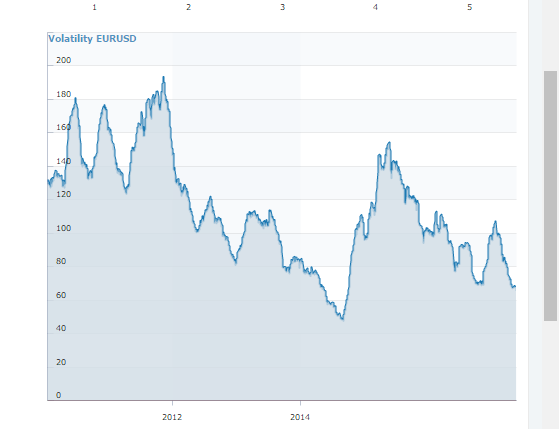The world’s most popular currency pair is not moving too much. That is no secret. This lack of movements means less opportunities to trade and more frustrated traders. EUR/USD is not alone: other currency pairs are also slow to move, yet the numbness is striking.
As this chart from Mataf shows, the pair moves no more than 68 pips per day in recent days. This is below the previous shallow levels of 71 seen in October 2016. We are now at the lowest levels since October 2014. The trough was in August of that year.
Big shocks – short-lived volatility
As aforementioned, this situation is frustrating. For traders looking for breakouts, there are far and few. And also for those settling for range trading, ranges have become narrower.
We had bouts of strong movements in the past year. The Brexit shock triggered a huge downfall of the pound in June 2016, followed by the flash crash in October. Trump’s elections resulted in a dollar rally. The first round of the French elections triggered a significant weekend gap.
There are also quite a few economic events that move markets: rate hikes in the US, fluctuations in oil prices and other monetary decisions and data shake markets.
Nevertheless, even the biggest moves do not last that long.
Why is volatility limited and when will markets wake up?
The easiest answer to the lack of volatility is the abundance of liquidity. Despite raising interest rates, the Fed’s balance sheet is maintained at a bloated $4.5 trillion. And despite reducing the monthly purchases, the ECB is still flooding the markets with €60 billion of freshly created euros every month.
The Fed has begun talking about squeezing its balance sheet and the ECB is likely to gradually stop buying bonds. Yet everything is gradual, as always with central banks.
Maybe a new political shock? The euro-zone can always supply crises, from the never-ending Greek saga, to German elections and to uncertainty about Italian banks. The scandals engulfing the Trump Administration provide lots of news.
But even if we get fresh political shocks, will it result in volatility? The recent past proves otherwise, but hopefully, things will change.
As you can see, there is pent up frustration in this article. The frustration is not limited to traders. Forex sites like Forex Crunch also suffer from the dearth of volatility: traffic moves with volatility.
When will this change? What do you think?

